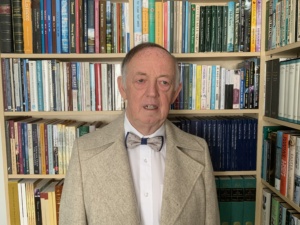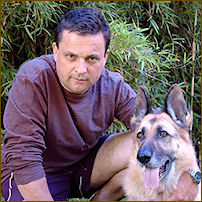 Damien Lewis has spent twenty years reporting from war, disaster and conflict zones around the world, chiefly as a TV journalist but also writing for the quality press. He has written a dozen non-fiction and fictional books, topping bestseller lists, and is published in some thirty languages worldwide. He was recently chosen as one of Britain’s ‘twenty favourite authors’ for the Government’s World Book Day, and his books have won a number of awards. Two of his books have been made into feature films, with a number of others presently under development, and he is scripting one or more of those movies.
Damien Lewis has spent twenty years reporting from war, disaster and conflict zones around the world, chiefly as a TV journalist but also writing for the quality press. He has written a dozen non-fiction and fictional books, topping bestseller lists, and is published in some thirty languages worldwide. He was recently chosen as one of Britain’s ‘twenty favourite authors’ for the Government’s World Book Day, and his books have won a number of awards. Two of his books have been made into feature films, with a number of others presently under development, and he is scripting one or more of those movies.
Damien Lewis became an author largely by accident, when a British publisher asked him if he’d be willing to turn a TV documentary he was working on into a book. That film was shot in the Sudan war zone, and told the story of how Arab tribes seized black African slaves in horrific slave raids. Lewis had been to the Sudan war zone dozens of times over the past decade, reporting on that conflict for the BBC, Channel 4 and US and European broadcasters.
His slavery documentary told the story of a young girl from the Nuba tribe, seized in a raid and sold into slavery in Khartoum, Sudan’s capital city, and of her epic escape. The publisher asked Lewis if the Nuba girl would be willing to write her life story as a book, with his help as co-author. The book that they co-wrote was called ‘Slave’, and it was published to great acclaim, becoming a number one bestseller and being translated into some 30 lanc guages worldwide. It won several awards and has been made into a feature film Over the preceding fifteen years Lewis had reported from many war, conflict and disaster zones – including Sudan, Sierra Leone, Eritrea, Zimbabwe, Nigeria, Iraq, Syria, Burma, Afghanistan and the Balkans. He (and his film crew) traveled into such areas with aid workers, the British or allied military, UN forces or local military groups, or very much under their own steam. He reported on the horror and human impact of war, as well as the drama of conflict itself. Often, he worked alone. Often, he filmed his own material over extended periods of time living in the war or conflict zone.
During a decade spent reporting from around the world Lewis lived in deserts, rainforests, jungles and chaotic third world cities. In his work and travels he met and interviewed people smugglers, diamond miners, Catholic priests ‘gone native’, desert nomads, un-contacted tribes, aid workers, bush pilots, arms dealers, genocidal leaders, peacekeepers, game wardens, slum kids, world presidents, heroin traffickers, rebel warlords, child prostitutes, Islamist terrorists, Hindu holy men, mercenaries, bush doctors, soldiers, commanders and spies. He was injured, and was hospitalised with bizarre tropical diseases – including flesh-eating bacteria, worms that burrow through the skin and septicemia – but survived all that and continued to report.
It was only natural that having seen so much of global conflict he would be drawn to stories of war, terrorism, espionage and the often dark causes behind such conflicts when he started writing books. Having written a number of true stories, in 2006 he was chosen as one of the ‘nation’s 20 favourite authors’ and wrote his first fiction, Desert Claw, for the British Government’s Quick Read initiative. Desert Claw tells of a group of ex-Special Forces soldiers sent into Iraq to retrieve a looted Van Gogh painting, with a savage twist to the tale. That fiction was followed up by Cobra Gold, an equally compelling tale of global drama and intrigue and shadowy betrayal.
Damien Lewis’s work, books and films have won the Index on Censorship (UK), CECRA (Spain), Project Censored (US), Commonwealth Relations (UK), Discovery-NHK BANFF (Canada), Rory Peck (UK), BBC One World (UK), BBC-WWF Wildscreen (UK), International Peace Prize (US), Elle Magazine Grande Prix (US), Victor Gollanz (Germany), and BBC One World (UK) Awards. He is a Fellow of the Winston Churchill Memorial Trust, and a Fellow of the Royal Geographical Society.
Web Site: www.damienlewis.com
Details of this year’s festival programme can be found elsewhere on this website.
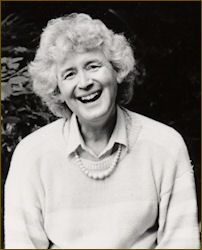 Jan Morris was born in 1926 of a Welsh father and an English mother, and when she is not travelling she lives with her partner Elizabeth Morris in the top left-hand corner of Wales, between the mountains and the sea.
Jan Morris was born in 1926 of a Welsh father and an English mother, and when she is not travelling she lives with her partner Elizabeth Morris in the top left-hand corner of Wales, between the mountains and the sea.


 Damien Lewis has spent twenty years reporting from war, disaster and conflict zones around the world, chiefly as a TV journalist but also writing for the quality press. He has written a dozen non-fiction and fictional books, topping bestseller lists, and is published in some thirty languages worldwide. He was recently chosen as one of Britain’s ‘twenty favourite authors’ for the Government’s World Book Day, and his books have won a number of awards. Two of his books have been made into feature films, with a number of others presently under development, and he is scripting one or more of those movies.
Damien Lewis has spent twenty years reporting from war, disaster and conflict zones around the world, chiefly as a TV journalist but also writing for the quality press. He has written a dozen non-fiction and fictional books, topping bestseller lists, and is published in some thirty languages worldwide. He was recently chosen as one of Britain’s ‘twenty favourite authors’ for the Government’s World Book Day, and his books have won a number of awards. Two of his books have been made into feature films, with a number of others presently under development, and he is scripting one or more of those movies.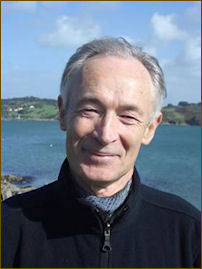 Tim Severin has sailed a leather boat across the Atlantic in the wake of St. Brendan the Navigator, captained an Arab sailing ship from Muscat to China to investigate the legends of Sindbad the Sailor, steered a replica of a Bronze Age galley to seek the landfalls of Jason and the Argonauts and of Ulysses, ridden the route of the first Crusader knights across Europe to Jerusalem, travelled on horse back with nomads of Mongolia in search of the heritage of Genghis Khan, sailed the Pacific on a bamboo raft to test the theory that ancient Chinese mariners could have reached to the Americas, retraced the journeys of Alfred Russell Wallace, Victorian pioneer naturalist, through the Spice Islands of Indonesia using a 19th century prahu, and traced the origins of Moby Dick, the great white whale among the aboriginal sea hunters of the Pacific.
Tim Severin has sailed a leather boat across the Atlantic in the wake of St. Brendan the Navigator, captained an Arab sailing ship from Muscat to China to investigate the legends of Sindbad the Sailor, steered a replica of a Bronze Age galley to seek the landfalls of Jason and the Argonauts and of Ulysses, ridden the route of the first Crusader knights across Europe to Jerusalem, travelled on horse back with nomads of Mongolia in search of the heritage of Genghis Khan, sailed the Pacific on a bamboo raft to test the theory that ancient Chinese mariners could have reached to the Americas, retraced the journeys of Alfred Russell Wallace, Victorian pioneer naturalist, through the Spice Islands of Indonesia using a 19th century prahu, and traced the origins of Moby Dick, the great white whale among the aboriginal sea hunters of the Pacific.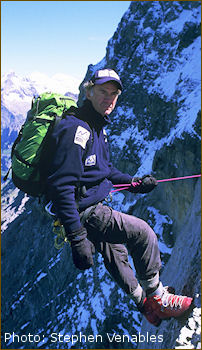 Born in the UK in 1944, just after his father was killed in the war. Brought up in South Africa and schooled in Eton College where he failed his A Levels. At the height of the Cold War, Sir Ranulph joined the Royal Scots Greys (Tanks) and went on to join the SAS in 1965/1966. At the time he was the youngest Captain in the British Army. Between 1968-1970 he fought Marxist Terrorists and received the Sultans Bravery Medal from HM the Queen. Between 1984 and 1990 Sir Ranulph was Vice President of PR and Adviser for Western Europe to Chairman of Occidental Petroleum Corp. In 1970 he married his childhood sweetheart and together they launched a series of record breaking expeditions that kept them ahead of their international rivals for three decades.
Born in the UK in 1944, just after his father was killed in the war. Brought up in South Africa and schooled in Eton College where he failed his A Levels. At the height of the Cold War, Sir Ranulph joined the Royal Scots Greys (Tanks) and went on to join the SAS in 1965/1966. At the time he was the youngest Captain in the British Army. Between 1968-1970 he fought Marxist Terrorists and received the Sultans Bravery Medal from HM the Queen. Between 1984 and 1990 Sir Ranulph was Vice President of PR and Adviser for Western Europe to Chairman of Occidental Petroleum Corp. In 1970 he married his childhood sweetheart and together they launched a series of record breaking expeditions that kept them ahead of their international rivals for three decades.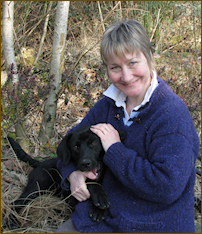 Pippa originally qualified in Interior Design but after a trip to Australia to sketch colonial buildings, returned to the UK and worked as an illustrator. In London she gained regular commissions for book and magazine publishers and national newspapers and became a Member of the Chartered Society of Designers. It was only when she had her own children however that she started writing children’s stories and poems, with her first poem published in an anthology in London in 1994.
Pippa originally qualified in Interior Design but after a trip to Australia to sketch colonial buildings, returned to the UK and worked as an illustrator. In London she gained regular commissions for book and magazine publishers and national newspapers and became a Member of the Chartered Society of Designers. It was only when she had her own children however that she started writing children’s stories and poems, with her first poem published in an anthology in London in 1994.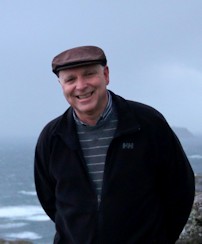 Paul Clements is the author of four travel books about Ireland, as well as works of biography and criticism, and is a contributing writer to three guidebooks to Ireland. His latest book, Wandering Ireland’s Wild Atlantic Way: From Banba’s Crown to World’s End (2016) is based on a journey along the west coast by car and bike, on horseback and on foot. Burren Country: Travels through an Irish limestone landscape is a collection of essays described as a love letter to the Burren published in 2011 by the Collins Press. The Height of Nonsense: The Ultimate Irish Road Trip (2005) and Irish Shores, A Journey Round the Rim of Ireland (1993) have both been reprinted in 2016. Paul’s acclaimed biography on the travel writer, actor and singer Richard Hayward, Romancing Ireland, was published in 2014 by Lilliput Press and adapted for BBC television. He has written and edited two books about the travel writer and historian Jan Morris. In 2012, he edited an anthology The Blue Sky Bends Overall, a celebration of ten years of the Immrama Festival of Travel Writing. A regular contributor to The Irish Times, he has written many ‘Irishman’s Diaries’ on cultural life and heritage, and reviews Irish local history books.
Paul Clements is the author of four travel books about Ireland, as well as works of biography and criticism, and is a contributing writer to three guidebooks to Ireland. His latest book, Wandering Ireland’s Wild Atlantic Way: From Banba’s Crown to World’s End (2016) is based on a journey along the west coast by car and bike, on horseback and on foot. Burren Country: Travels through an Irish limestone landscape is a collection of essays described as a love letter to the Burren published in 2011 by the Collins Press. The Height of Nonsense: The Ultimate Irish Road Trip (2005) and Irish Shores, A Journey Round the Rim of Ireland (1993) have both been reprinted in 2016. Paul’s acclaimed biography on the travel writer, actor and singer Richard Hayward, Romancing Ireland, was published in 2014 by Lilliput Press and adapted for BBC television. He has written and edited two books about the travel writer and historian Jan Morris. In 2012, he edited an anthology The Blue Sky Bends Overall, a celebration of ten years of the Immrama Festival of Travel Writing. A regular contributor to The Irish Times, he has written many ‘Irishman’s Diaries’ on cultural life and heritage, and reviews Irish local history books.